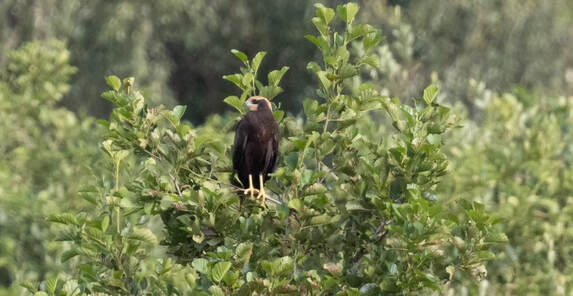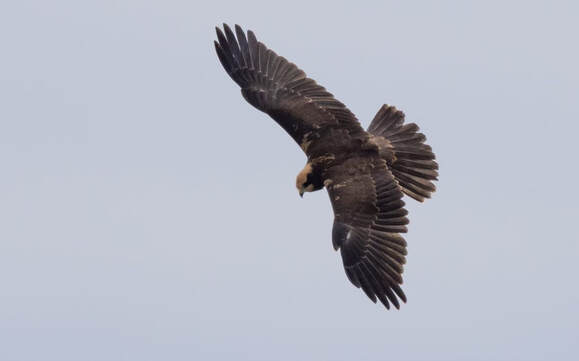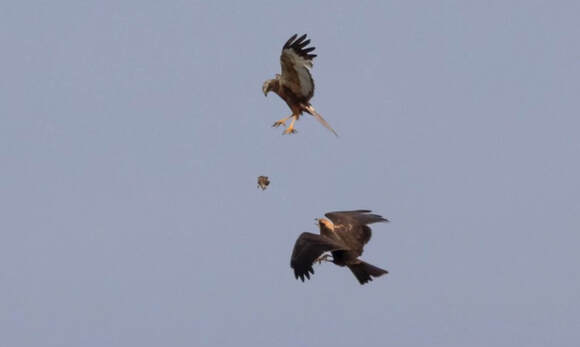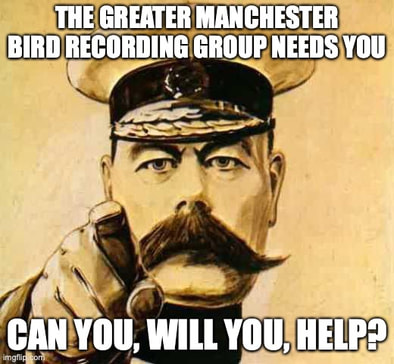|
The 2023 BTO Manchester Region Review has now been added to the 'miscellaneous' section of the Articles page.
0 Comments
It is with great pleasure I can confirm that a pair of Marsh Harriers successfully fledged three young at the Wigan Flashes Local Nature Reserve during August 2023. This is the first ever breeding record of the species in Greater Manchester and is testament to the years of work carried out by the Lancashire Wildlife Trust in their management of the site and in particular its reedbeds. My thanks to Andy Makin for his vigilance in monitoring the birds and providing important data which has been entered into the county database and passed on to the Greater Manchester Ecology Unit. Below: juvenile Marsh Harriers at the Wigan Flashes LNR, August 2023. Both photos courtesy of Martin Loftus Below: adult male Marsh Harrier drops prey to one of its young at the Wigan Flashes LNR, August 2023. Photo courtesy of Martin Loftus Below: juvenile Marsh Harrier at the Wigan Flashes LNR, August 2023. Videos courtesy of Andy Makin
A pair of Bee-eaters have bred at an undisclosed site in Greater Manchester but unfortunately on 20th July, it appears the birds abandoned and departed the area, possibly due to predation or some form of internal collapse of the nest burrow.
The birds first appeared in mid-June and quickly began breeding activity at a location which simply did not lend itself to large scale viewing, which would likely have caused disturbance to the birds. Discussions immediately took place with the most senior members of the RSPB Investigations Team who have dealt with all previous Bee-eater nesting attempts in the UK and under their expert guidance the news was supressed for the birds’ welfare. Further discussions and daytime nest watching and protection took place by a small but incredibly diligent team of local observers. It is believed that the first chick(s) likely hatched around the 13th July and with that, The Head of RSPB Investigations had intended to attend the site with the local observation team on Saturday 22nd July with a view to plan and potentially implement some form of public viewing once it was believed all the chicks had hatched and were near to fledging, in order to reduce the potential for any disturbance. Unfortunately, it seems luck was not on our, or more importantly, the Bee-eaters’ side. The site will remain confidential in the hope the birds may return next year and will get to a point where viewing may be permissible, but I would like to assure all observers that all possibilities for large-scale viewing prior to this point were considered but the birds’ welfare simply had to come first. Cheers, Ian With the ever increasing number of bird recording systems available to birders these days, this article by Assistant County Bird Recorder for Greater Manchester Steve Atkins, explains how to record the breeding birds you see so they can provide very important information which can be utilised in various conservation and ecological programs and why Greater Manchester's own recording system SWIFT provides the best platform for use in our county.
THE GREATER MANCHESTER COUNTY BIRD REPORT IS BACK
Well, kind of… Let’s cut to the chase, the Greater Manchester County Bird report is now 10 years out of date, however its catch up concept is alive and kicking but ultimately, will depend pretty much entirely upon your help to come to fruition. So, we are looking for those to join us in the exciting concept of designing and writing something innovative, an opportunity to be part of the complete process and bring it to life. A concept of two completely new style reports spanning five years each which gives us the opportunity to compare the annual data and to write and represent it in a fresh and engaging manner. There are opportunities for all skills and experience, from section and species writers to photographic editors, data analysts and proof-readers. If you have something to offer, even if that’s only currently enthusiasm, passion, and desire, then please get in touch for more details and let’s make it happen! We’d love to hear from you. Ian Ian McKerchar County Bird Recorder, Greater Manchester [email protected] Greater Manchester County Rarities Committee seeks expressions of interest for new members15/10/2022 With the current Greater Manchester County Rarities Committee members having served for a considerable amount of time now, we are seeking expressions of interest from potential new members to serve on its five-member committee.
Whilst the committee’s workload is reasonably low and in these days of digital photography much of that is made up of well photographed birds, we still encounter many challenges which ensure our work is varied and interesting, preserving the quality and standard of records within the county database which go on to be employed in important County and National commissions. Term of service is expected to be five years and our work is conducted mainly via email with the occasional informal get together as and when required. The following are considered desirable attributes for potential members:
Anyone interested should send a short (or long if you prefer!) birding biography of themselves via email and are also very welcome to contact me by any means to discuss anything to do with working within the committee or any other queries they may have. Ian [email protected] The sad passing of Roy Rhodes in March 2022 has left a huge void in the conservation efforts and ecology in the North-West but his achievements are rightly honoured and celebrated by two gentlemen who knew him as a friend in their own deeply personal and adoring compositions.
They can be read on the 'Miscellaneous' page here. Database Assistant – Greater Manchester Bird Recording Group The Greater Manchester Bird Recording Group (GMBRG) wishes to appoint a Database Assistant (voluntary role) to support the work of the group in conserving Greater Manchester’s birds and the sites on which they depend. GMBRG’s database is a vital tool in this work and provides the most comprehensive and up to date information on the distribution and status of the county’s birds, currently holding over one million records dating back to 1992. Role and Responsibilities The person appointed will work closely with the County Recorder and Assistant County Recorder to deliver the following:
Essential skills/knowledge
Personal qualities A passion for birds and their conservation, enthusiasm, commitment, and the ability to work as part of a small team are all essential. The role would suit either an experienced recorder, or someone who is keen to develop their recording skills and make an important contribution to our knowledge of the county’s birds. Training The successful applicant will receive training in the following areas, as required.
How to apply Write a summary of your relevant experience and skills and explain why you are interested in taking on the role. Please email this to Ian McKerchar, Greater Manchester County Recorder and GMBRG Chairman [email protected] You are welcome to phone Ian for an initial discussion or if you have any further queries, mobile no. 07958 687481 Colour-ringed birds provide considerable enjoyment and interest for county birders and there are several schemes operating within the county for various species. The organisers of those schemes would not only welcome any sightings of such birds but also to provide background information on them to anyone supplying details, so now's your chance to expand your birding to include looking for colour-ringed birds if it doesn't already!
The page will be expanded to include other schemes and any in the future. It can be found on the 'Record Submission' page at https://www.manchesterbirding.com/record-submission.html The British Birds Rarities Committee (BBRC) has announced that it is to consider all records of White-spotted Bluethroat Luscinia svecica cyanecula, a decision backdated to the 1st January 2021, with any sightings of breeding-plumaged males, or females/non-breeding males where there is reasonable evidence to suggest that subspecies, welcomed for submission.
White-spotted Bluethroat is a rare migrant to Britain, with records chiefly falling in March and the first half of April, a time when any Bluethroat seen is almost certainly going to be that subspecies. Red-spotted Bluethroat is a more numerous migrant that occurs later in the spring, primarily in May (there are just three previous April occurrences, the earliest being on 18th). The subspecies is also a very rare breeder in Britain, with males very occasionally setting up territory (recent examples of such behaviour come from Cambridgeshire and Norfolk). Greater Manchester has only one record of Bluethroat, with a male at Haigh on the 18th May 1985, though surprisingly, the racial identification of this bird appears not to have been made by the observer. |
||||||||||||||||||||
|
|
Birds, birders and birding in Greater Manchester and way beyond...
|





